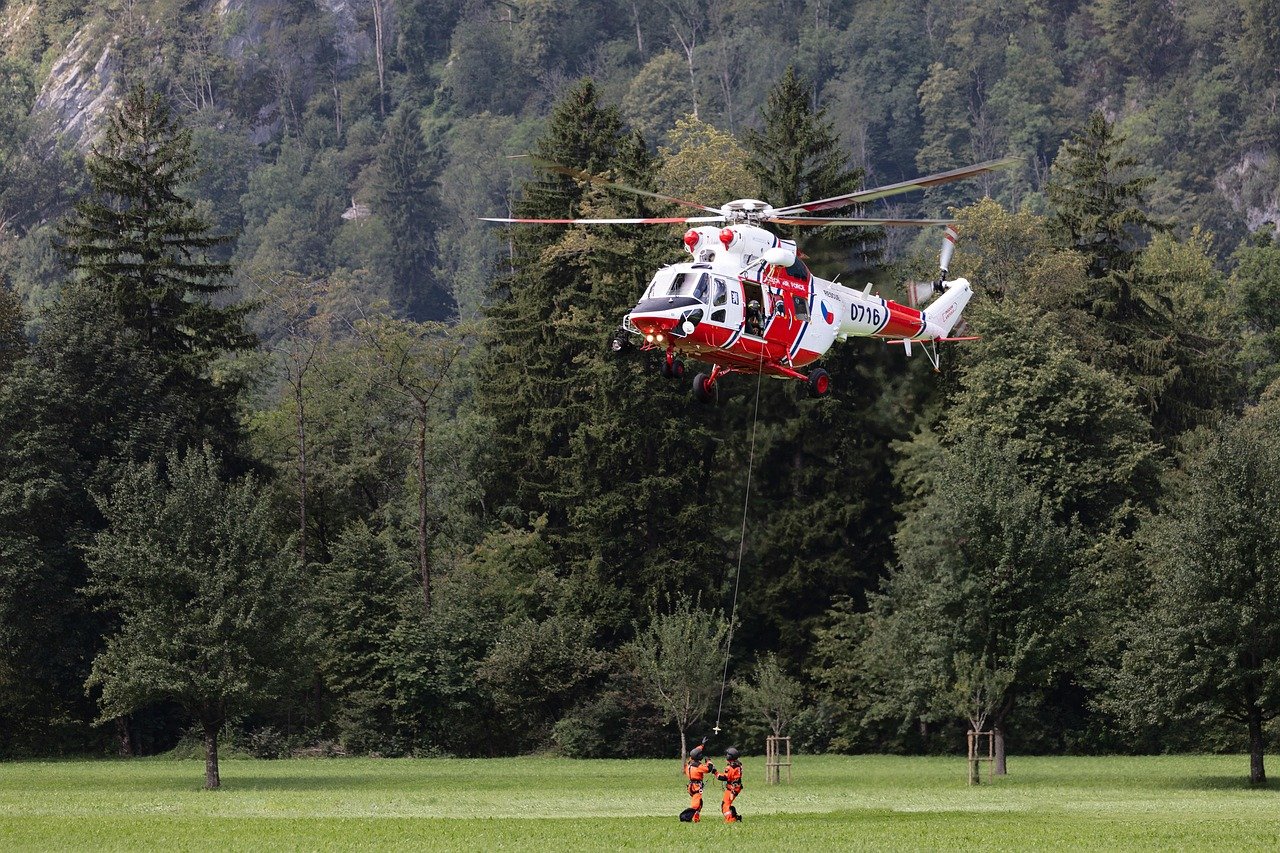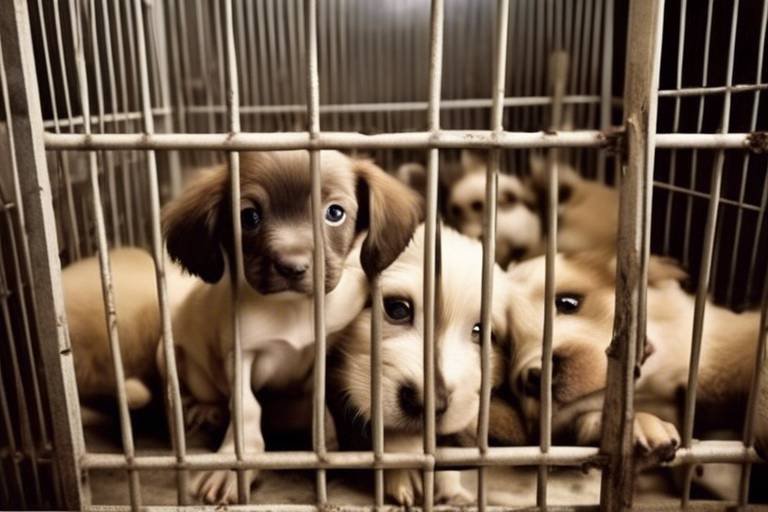How to Find a Reputable Animal Rescue Organization
Finding a reputable animal rescue organization can feel like searching for a needle in a haystack, especially with so many options available. You want to ensure that your time, effort, and donations go to a cause that genuinely helps animals in need. The good news is that with a little guidance and some key indicators, you can navigate this landscape effectively. In this article, we’ll explore the steps you need to take to identify trustworthy rescues, ensuring that your support makes a real difference.
First and foremost, it's essential to understand what animal rescue organizations are all about. These groups vary widely in their missions—from rescuing stray pets, rehabilitating injured wildlife, to advocating for animal rights. Each organization may have its unique focus, but the core goal remains the same: to provide shelter, care, and ultimately a second chance for animals in distress. By supporting reputable rescues, you not only contribute to the welfare of animals but also foster a community of compassion and responsibility.
Now, you might be wondering, "How do I know which rescues are truly reputable?" That's where our guide comes in. We will delve into the characteristics that define trustworthy rescues, explore effective research methods, and even discuss the importance of visiting facilities in person. So, buckle up, and let’s embark on this journey to find a rescue organization that aligns with your values and commitment to animal welfare!

Understanding Animal Rescue Organizations
When it comes to animal welfare, animal rescue organizations play a crucial role in providing shelter, care, and love to animals in need. But what exactly are these organizations? At their core, they are dedicated groups that work tirelessly to save animals from abuse, neglect, or abandonment. They come in various forms, including local shelters, foster networks, and larger non-profit organizations. Each type has its unique mission, but they all share a common goal: to ensure the safety and well-being of animals.
Understanding the different types of animal rescue organizations is essential for anyone looking to support these noble causes. For instance, some organizations focus on specific species, such as dogs, cats, or even exotic animals, while others may be more general. Many rescues also engage in outreach programs, helping to educate the public about responsible pet ownership and the importance of spaying and neutering. This education is vital, as it can significantly reduce the number of animals that end up in shelters.
Supporting reputable animal rescue organizations is not just about donating money or adopting a pet; it’s about ensuring that your efforts genuinely contribute to the welfare of animals. When you choose to support a trustworthy rescue, you are helping to create a community where animals are treated with respect and compassion. Remember, not all organizations operate with the same level of integrity, so it’s essential to do your homework before getting involved.
In addition to adopting and fostering animals, many rescue organizations also rely heavily on volunteers and donations to operate effectively. Volunteers can help with everything from walking dogs and cleaning kennels to organizing fundraising events. Donations, whether monetary or in-kind, provide the resources necessary to feed, shelter, and care for the animals. This collaborative effort between the community and the rescue organizations is what makes a significant impact in the lives of countless animals.
Ultimately, understanding animal rescue organizations means recognizing the vital role they play in animal welfare. By supporting reputable rescues, you can be confident that your contributions are making a difference. Whether you’re considering adoption, volunteering, or simply spreading the word, your involvement can help create a brighter future for animals in need.

Key Characteristics of Reputable Rescues
When it comes to supporting animal rescue organizations, it's essential to ensure that your contributions are going to reputable rescues that genuinely prioritize the welfare of animals. So, what exactly sets these organizations apart from the rest? First and foremost, transparency and accountability are critical traits. A reputable rescue will openly share information about its operations, finances, and the animals in its care. This openness helps build trust and ensures that donors know their contributions are being utilized effectively.
Another key characteristic is the presence of positive reviews and testimonials from the community. When an organization consistently receives praise from adopters and volunteers, it reflects a commitment to ethical practices and quality care. Moreover, look for rescues that have established clear and fair adoption policies. This ensures that the process is safe for both the animals and the adopters, promoting responsible pet ownership.
Transparency is not just a buzzword; it’s a fundamental aspect of any reputable animal rescue. For instance, organizations should provide public access to their financial records, allowing potential donors to see how funds are allocated. This practice not only reassures supporters but also encourages responsible management of donations. When you can view how much money goes towards veterinary care, food, and shelter, you can feel confident that your support is making a tangible difference.
Accessible financial records are vital for assessing an organization's legitimacy. Reputable rescues often publish annual reports or financial statements on their websites, detailing income, expenses, and the impact of their work. This level of transparency helps you understand whether the organization is using donations wisely. If you can’t find this information readily available, it might be a red flag.
Another hallmark of a reputable rescue is having clear adoption policies. These policies should outline the steps involved in the adoption process, including screening procedures, fees, and post-adoption support. A transparent process not only protects the animals but also prepares adopters for a successful transition into pet ownership. Organizations that prioritize the welfare of their animals will ensure that their policies are straightforward and accessible.
A reputable animal rescue is often deeply rooted in its community. They engage in outreach initiatives, educational programs, and partnerships with local businesses to promote animal welfare. By actively participating in community events, these organizations not only raise awareness about their mission but also foster a sense of community involvement. When you see a rescue that collaborates with local schools, businesses, and other nonprofits, you can be more confident in their commitment to making a positive impact.
In summary, when evaluating animal rescue organizations, focus on their transparency, community involvement, and clear policies. These characteristics are not just nice-to-haves; they are essential indicators of a rescue's commitment to ethical practices and animal welfare. By supporting reputable rescues, you can make a meaningful difference in the lives of animals in need.
- How can I verify if an animal rescue is reputable?
Check for transparency in their operations, read online reviews, and look for community involvement. - What should I ask before adopting from a rescue?
Inquire about their adoption policies, veterinary care protocols, and post-adoption support. - Are donations to animal rescues tax-deductible?
Most reputable rescues are 501(c)(3) organizations, making donations tax-deductible. Always confirm their status.
Transparency and Accountability
When it comes to supporting animal rescue organizations, transparency and accountability are paramount. These traits not only define the integrity of an organization but also establish trust between the rescue and its supporters. A reputable animal rescue should openly share information about its operations, financial health, and the welfare of the animals in its care. This transparency allows you, as a potential supporter or adopter, to feel confident that your contributions are making a real difference.
One key aspect of transparency is the availability of public financial records. A trustworthy rescue organization will provide access to its financial statements, showing how funds are allocated and spent. This can include details on operational costs, veterinary expenses, and how much of the donations go directly to animal care versus administrative costs. Understanding these figures can help you assess whether the organization is using its resources effectively to promote animal welfare. For instance, a rescue that spends a significant percentage of its budget on animal care rather than overhead costs is likely prioritizing the well-being of its animals.
Additionally, clear adoption policies are another hallmark of a reputable rescue. These policies should be straightforward, outlining the adoption process, fees, and requirements for potential adopters. When an organization has well-defined guidelines, it not only protects the animals but also ensures that adopters are well-informed and prepared for the responsibilities of pet ownership. For example, a responsible rescue might require potential adopters to fill out an application, undergo an interview, and provide references before finalizing an adoption. This thorough approach helps ensure that animals are placed in loving and suitable homes.
Moreover, accountability goes hand-in-hand with transparency. A reputable animal rescue should be willing to answer questions from the public about its practices and policies. This includes being open about how animals are cared for, the training staff and volunteers receive, and the protocols in place for veterinary care. If an organization hesitates to provide this information, it could be a red flag. A genuine rescue will welcome inquiries and provide detailed answers, demonstrating their commitment to ethical practices in animal care.
In conclusion, when evaluating an animal rescue organization, always prioritize transparency and accountability. These qualities not only reflect the organization's integrity but also ensure that your support is directed towards a cause that genuinely cares for the welfare of animals. By doing your homework and asking the right questions, you can confidently choose a rescue that aligns with your values and makes a significant impact in the lives of animals in need.
- What should I look for in an animal rescue organization? Look for transparency in operations, positive reviews, clear adoption policies, and community engagement.
- How can I verify the legitimacy of a rescue organization? Check for public financial records, read online reviews, and ask about their veterinary care practices.
- Why is community involvement important for animal rescues? Community engagement reflects the organization's commitment to animal welfare and responsible rescue practices.
- What questions should I ask before supporting an animal rescue? Inquire about their adoption processes, veterinary care protocols, and how they handle animal welfare.
Public Financial Records
When it comes to supporting an animal rescue organization, one of the most crucial aspects to consider is their financial transparency. Public financial records serve as a window into how an organization operates, showcasing not only its income sources but also how funds are allocated. By reviewing these records, you can gain a clearer understanding of whether the organization is genuinely committed to its mission or if it might be misusing donations. Think of it like peeking behind the curtain of a magic show; it reveals the tricks and truths that the audience may not see at first glance.
Most reputable animal rescues will provide easy access to their financial statements, often available on their official websites. These records typically include:
- Annual reports detailing income, expenses, and overall financial health.
- IRS Form 990, which non-profit organizations are required to file, giving insights into revenue and expenditures.
- Budget breakdowns that illustrate how funds are allocated across various programs, including animal care, outreach, and administrative costs.
By analyzing these documents, you can ask yourself some important questions: Are the majority of funds going directly to animal care and rescue efforts? How much is spent on administrative costs versus direct animal welfare? A well-managed organization should ideally allocate a significant portion of its budget to the animals it serves, rather than administrative overhead or fundraising expenses.
Furthermore, transparency in financial operations fosters trust. When an organization openly shares its financial records, it demonstrates a commitment to accountability. This is essential for building a loyal community of supporters who feel confident that their contributions are making a real difference. As an informed supporter, you have the power to ensure that your donations are not just a drop in the bucket but a meaningful contribution to the welfare of animals in need.
In summary, examining public financial records is a vital step in identifying a reputable animal rescue organization. By doing so, you not only protect your own interests as a donor but also contribute to a culture of accountability within the animal welfare community. Remember, every dollar counts, and ensuring that your support goes to a trustworthy organization can help save lives and provide a brighter future for countless animals.
Clear Adoption Policies
When you're looking to support an animal rescue organization, one of the most crucial aspects to consider is their adoption policies. A reputable rescue will have clearly defined, transparent policies that ensure a safe and responsible process for both the animals and their potential adopters. Think of these policies as the foundation of a healthy relationship between the rescue, the animals, and the new families they join. Without these guidelines, the adoption process can become chaotic, leading to misunderstandings and, ultimately, more animals in need of rescue.
Clear adoption policies not only protect the animals but also help prospective adopters understand the expectations and responsibilities involved in bringing a new pet into their home. For instance, a good adoption policy might outline the following:
- Screening Procedures: This includes background checks, home visits, and interviews to ensure that the potential adopter is a good fit for the animal.
- Adoption Fees: Understanding the costs involved helps adopters plan financially. Fees often cover vaccinations, spaying or neutering, and other medical care.
- Return Policies: A reputable organization will have a clear policy on what happens if an adoption doesn’t work out, which can provide peace of mind for adopters.
Moreover, these policies should be easily accessible—whether on the organization's website or in printed materials at their facility. Transparency in adoption policies builds trust and shows that the organization is committed to the welfare of the animals and the families that adopt them. When you can see that an organization takes the time to create and uphold these standards, it’s a strong indicator that they are serious about their mission.
Additionally, it’s important to ask about their post-adoption support. A reputable rescue will often provide resources and assistance to help new pet owners transition smoothly into their new roles. This might include training tips, behavioral resources, or even a hotline for questions that arise after adoption. After all, adopting an animal is not just a one-time event; it’s the beginning of a long-term commitment.
In summary, clear adoption policies are a hallmark of a reputable animal rescue organization. They ensure that the process is fair, responsible, and beneficial for everyone involved—especially the animals. So, as you research potential rescues, take the time to review their adoption policies. It’s a small step that can lead to a significant impact on the lives of countless animals waiting for their forever homes.
Q: Why are clear adoption policies important?
A: Clear adoption policies protect both the animals and the adopters by ensuring a responsible and transparent process.
Q: What should I look for in an adoption policy?
A: Look for screening procedures, adoption fees, return policies, and post-adoption support to ensure a comprehensive approach.
Q: How can I find out more about an organization's adoption policies?
A: Visit their website, contact them directly, or visit their facility to ask questions and review their materials.
Community Engagement and Support
When it comes to animal rescue organizations, community engagement and support are not just buzzwords; they are the lifeblood of a truly effective rescue operation. A reputable animal rescue doesn't operate in isolation; rather, it actively seeks to involve the community in its mission to help animals in need. This involvement can take many forms, from educational outreach programs to volunteer opportunities and fundraising events. By fostering a strong connection with the community, these organizations not only raise awareness about animal welfare but also cultivate a network of passionate advocates who can amplify their efforts.
Think about it: when a rescue organization is well-integrated into the community, it can tap into a wealth of resources and support. For instance, local businesses might sponsor events, schools may participate in educational programs, and individuals can volunteer their time or donate supplies. This collaborative spirit not only enhances the organization's ability to care for animals but also strengthens the community's commitment to animal welfare. It's a win-win situation!
Furthermore, community engagement often leads to increased visibility for the organization. When people see their friends and neighbors supporting a cause, they are more likely to get involved themselves. This can create a ripple effect, where one person's passion for animal rescue inspires others to join the cause. Social media plays a significant role here, as organizations can share their successes, promote upcoming events, and highlight the animals in their care. If you see a post about a local rescue's adoption event, for example, you might be more inclined to attend and possibly adopt a furry friend!
Another important aspect of community support is the feedback loop it creates. When organizations engage with their communities, they can gather valuable insights into the needs and concerns of local residents. This feedback can help rescues tailor their programs and services to better meet the needs of both animals and the people who care about them. For instance, if a community expresses a strong interest in fostering programs, a rescue might expand its offerings to include more comprehensive training for foster families. This responsiveness not only strengthens the organization but also builds trust and loyalty among supporters.
In conclusion, community engagement and support are essential for the success of animal rescue organizations. By actively involving the community in their mission, these organizations can create a sustainable model for animal welfare that benefits everyone involved. So next time you’re considering supporting a local rescue, take a moment to evaluate their community involvement. It might just be the key indicator of their overall effectiveness and commitment to making a difference.
- What should I look for when evaluating community engagement? Look for partnerships with local businesses, participation in community events, and outreach programs that educate the public about animal welfare.
- How can I get involved with a local animal rescue? You can volunteer your time, donate supplies, or participate in fundraising events. Many organizations also welcome foster families for animals in need.
- What are some signs that an organization is genuinely engaged with the community? Regular communication through social media, participation in local events, and positive testimonials from community members are good indicators.

Researching Local Organizations
When it comes to finding a reputable animal rescue organization, doing your homework is essential. The world of animal rescue can be overwhelming, with so many organizations vying for your attention and support. However, with a little effort, you can uncover the gems that truly make a difference in the lives of animals. Start by tapping into your local community resources. Local animal shelters, veterinary clinics, and even pet supply stores can be excellent sources of information. They often have connections with reputable rescues and can provide recommendations based on their experiences.
In today's digital age, the internet is a treasure trove of information. Websites dedicated to animal welfare often feature directories of local rescues. You can also check social media platforms where many organizations maintain a presence. Engaging with their posts can give you a feel for their mission and community involvement. Don't underestimate the power of word-of-mouth recommendations! Talking to friends, family, or co-workers who are passionate about animals can lead you to trustworthy rescues that you may not have discovered on your own.
Another effective method for researching local organizations is to read online reviews and ratings. Websites like Yelp or Google Reviews can provide insights into the experiences of others who have interacted with these organizations. Pay attention to patterns in the reviews—are there consistent praises or complaints? This can help you gauge the reliability and reputation of a rescue organization.
To summarize, here are some key points to consider when researching local animal rescue organizations:
- Community Resources: Check with local shelters, veterinary clinics, and pet supply stores for recommendations.
- Online Presence: Explore websites and social media platforms for information and community engagement.
- Word-of-Mouth: Talk to friends and family who are involved in animal welfare.
- Online Reviews: Read reviews on platforms like Yelp and Google to gauge reputation.
By using these strategies, you can sift through the noise and find organizations that align with your values and truly care for animals in need. Remember, the more informed you are, the better equipped you'll be to make a positive impact on the lives of these animals.
1. How can I verify if an animal rescue organization is legitimate?
Look for transparency in their operations, positive reviews from previous adopters, and clear adoption policies. Additionally, reputable organizations often provide public financial records.
2. What should I look for when visiting a rescue facility?
Pay attention to the living conditions of the animals, cleanliness of the facility, and how the staff interacts with the animals. This can give you a good idea of the organization's commitment to animal welfare.
3. Are all animal rescues non-profit organizations?
Not all animal rescues are non-profit, but many operate under that model to ensure that donations go directly to animal care. Always check their status and how they manage funds.
4. Can I volunteer at an animal rescue organization?
Absolutely! Many rescues welcome volunteers to help with various tasks, from animal care to event planning. It’s a great way to get involved and see the organization in action.
5. What types of questions should I ask before supporting a rescue?
Inquire about their veterinary care protocols, adoption and foster programs, and how they handle animal intake and care. These questions can help you assess their commitment to animal welfare.
Online Reviews and Ratings
In today's digital age, serve as a powerful tool for anyone looking to support an animal rescue organization. These reviews can provide a window into the experiences of others who have interacted with the organization, offering insights that might not be visible at first glance. Imagine trying to choose a restaurant based solely on its exterior; you’d want to know what the food is like, right? Similarly, when considering an animal rescue, it’s essential to dig deeper than just their website or social media presence.
When browsing through online reviews, look for patterns in the feedback. Are there consistent praises about the organization’s transparency, or are there red flags raised by multiple reviewers? Websites like Yelp, Google Maps, and Facebook can be excellent resources. They not only provide star ratings but also detailed comments from previous adopters and volunteers. A high rating is a good start, but it’s the content of the reviews that can reveal the true nature of the organization.
Furthermore, consider the recency of the reviews. An organization that has received positive feedback consistently over the past few months is likely doing something right. On the other hand, if the majority of reviews are outdated or there’s a sudden influx of negative comments, it might be a red flag. It’s like checking the freshness of produce at the grocery store; you want to ensure you’re getting the best quality available.
Also, don’t overlook the importance of context. Some reviews may highlight specific incidents or experiences that could be misleading without additional information. For example, if someone had a negative experience due to a misunderstanding during the adoption process, it doesn't necessarily reflect the overall quality of the organization. Therefore, reading a range of reviews can help you form a more balanced view.
In addition to general reviews, look for ratings from animal welfare organizations or local community groups. These ratings often assess rescues based on criteria like their adoption processes, animal care standards, and community involvement. For instance, a table summarizing the ratings from different platforms can be particularly helpful:
| Platform | Rating | Number of Reviews |
|---|---|---|
| Yelp | 4.5/5 | 120 |
| 4.8/5 | 200 | |
| 4.7/5 | 150 |
Ultimately, are invaluable in your quest to find a reputable animal rescue organization. They offer a glimpse into the experiences of others, helping you make an informed decision about where to lend your support. So, before you dive into the world of animal rescue, take a moment to explore what others have to say. It’s a small step that can lead to a big impact in the lives of animals in need.
- How can I verify the legitimacy of an animal rescue organization? Check for online reviews, ratings, and their presence on social media.
- What should I do if I find negative reviews? Consider the context and look for patterns in the feedback.
- Are all online reviews trustworthy? Not all reviews are genuine, so it’s essential to evaluate the credibility of the sources.
- How important are community recommendations? Community recommendations can provide valuable insights and often reflect the organization’s reputation.
Networking with Other Animal Advocates
This article provides guidance on identifying trustworthy animal rescue organizations, ensuring that your support goes to legitimate causes and helps animals in need effectively.
Learn about the different types of animal rescue organizations, their missions, and the importance of supporting reputable groups in your community.
Discover the essential traits that define reputable animal rescues, including transparency, positive reviews, and ethical practices in animal care and adoption.
Explore how transparency in operations and financial accountability are vital indicators of a trustworthy animal rescue organization.
Understanding the significance of accessible financial records can help you assess an organization's legitimacy and responsible use of donations.
Reputable rescues should have clear and fair adoption policies, ensuring a safe and responsible process for both animals and adopters.
Learn how community involvement and outreach initiatives reflect an organization's commitment to animal welfare and responsible rescue practices.
Find out effective methods for researching local animal rescue organizations, including online resources, social media, and word-of-mouth recommendations.
Utilize online platforms to read reviews and ratings, helping you gauge the reputation and reliability of various animal rescues.
Connecting with fellow animal lovers can be one of the most rewarding experiences when searching for a reputable animal rescue organization. By networking with other advocates, you not only broaden your understanding of local rescues but also build a support system that shares your passion for animal welfare. Have you ever thought about how much more effective we can be when we work together? It’s like assembling a puzzle; each piece represents a unique insight or experience that contributes to the bigger picture of animal rescue.
Engagement in local animal advocacy groups, whether online or in-person, can lead to invaluable resources and recommendations. For instance, social media platforms like Facebook and Instagram often host community groups dedicated to animal rescue. These groups can serve as a hub for sharing information, organizing events, and discussing best practices. You might find people sharing their personal experiences with various rescues, highlighting the ones that truly make a difference in the lives of animals.
Additionally, attending local animal events or fundraisers can provide opportunities to meet like-minded individuals. You can ask questions, share experiences, and even collaborate on initiatives that promote animal welfare. By fostering these connections, you can create a network of advocates who are just as passionate about helping animals as you are. Imagine the impact we could have if we all shared our knowledge and resources!
In essence, networking with other animal advocates not only enhances your understanding of reputable organizations but also empowers you to make informed decisions about where to lend your support. It’s about creating a community that stands together for a cause we all believe in—giving animals the love and care they deserve.
Discover the benefits of visiting animal rescue facilities to observe their operations, meet staff, and assess the living conditions of the animals.
Learn what to look for when evaluating the living conditions of animals at rescue facilities, ensuring they meet high welfare standards.
Engaging with staff and volunteers can provide insight into the organization's values, commitment, and overall atmosphere of care.
Prepare a list of essential questions to ask when considering support for an animal rescue organization, ensuring they align with your values and expectations.
Understanding the veterinary care protocols in place is crucial for ensuring the health and well-being of rescued animals.
Inquire about the organization's adoption and foster programs, which are vital for the successful rehoming of animals in need.
- What should I look for when choosing a rescue organization? Look for transparency, positive reviews, and clear adoption policies.
- How can I verify the legitimacy of an animal rescue? Research their financial records, read reviews, and visit their facilities if possible.
- Can I volunteer at a rescue organization? Yes! Many rescues welcome volunteers to help with various tasks.
- What types of animals do rescues typically help? Rescues often focus on dogs, cats, and sometimes other small animals or exotic pets.
- How can I support an animal rescue organization? You can donate, volunteer, or adopt an animal in need.

Visiting Rescues in Person
When it comes to supporting animal rescue organizations, nothing beats the experience of visiting them in person. Imagine stepping into a space filled with wagging tails and purring cats, a place where love and compassion are palpable. By visiting a rescue, you're not just donating your time or money; you're witnessing firsthand the impact of their work. This immersive experience can help you gauge the organization's commitment to animal welfare and ensure that your support is going to a place that truly cares.
During your visit, take the opportunity to observe the living conditions of the animals. Are the cages clean? Do the animals appear healthy and well-cared for? These are crucial indicators of the rescue's operational standards. You might even consider asking about their daily routines and how they ensure each animal receives the care it needs. A reputable organization will be more than happy to share their practices with you, as transparency is a hallmark of a trustworthy rescue.
Another important aspect to consider during your visit is how the staff interacts with the animals. Are they gentle and attentive? Do they seem knowledgeable about the specific needs of each animal? Engaging with staff and volunteers can provide valuable insight into the rescue's culture and values. You might find that the passion they have for animal welfare is infectious, and it can help you feel more connected to the cause.
As you walk through the facility, don't hesitate to ask questions. Here are some key areas to focus on:
- Animal Care: Inquire about the daily care routines for the animals, including feeding, exercise, and socialization.
- Veterinary Care: Ask how often the animals receive veterinary check-ups and what protocols are in place for medical emergencies.
- Adoption Process: Understanding their adoption process can help you see how they ensure that animals find loving homes.
Moreover, visiting in person allows you to see how the rescue engages with the community. Do they host events, educational programs, or volunteer opportunities? Community involvement is a strong indicator of a rescue's commitment to animal welfare and responsible practices. It reflects their dedication not just to the animals in their care, but also to educating the public about animal issues and the importance of adoption.
In summary, visiting animal rescues in person is an invaluable step in determining which organization to support. It allows you to observe the conditions of the animals, interact with staff, and ask pertinent questions. This hands-on experience can help you make an informed decision, ensuring that your contributions truly benefit animals in need. So, grab your phone, schedule a visit, and prepare to be inspired by the incredible work being done to save lives!
1. Why should I visit an animal rescue in person?
Visiting in person allows you to see the conditions in which the animals are kept and to engage with the staff, giving you a clearer picture of the organization's values and practices.
2. What should I look for during my visit?
Pay attention to the cleanliness of the facility, the health and behavior of the animals, and how the staff interacts with both the animals and visitors.
3. Can I ask questions during my visit?
Absolutely! Reputable rescues welcome inquiries and are happy to share information about their operations, animal care protocols, and adoption processes.
4. How can I support a rescue after visiting?
You can support a rescue by adopting, volunteering, donating supplies, or contributing financially, depending on your capacity and interest.
Assessing Animal Living Conditions
When you decide to support an animal rescue organization, one of the most critical aspects to evaluate is the living conditions of the animals in their care. After all, the welfare of these animals should be the top priority. Imagine walking into a place where the air is filled with barking and meowing, but instead of chaos, you find cleanliness, comfort, and a sense of security. This is what you should look for when visiting a rescue facility.
First and foremost, you should observe the general cleanliness of the facility. Are the cages or kennels clean and well-maintained? A reputable rescue organization will prioritize hygiene, as this is essential for preventing the spread of diseases among the animals. Look for signs of regular cleaning schedules, such as fresh bedding and clean water bowls. If you notice any unpleasant odors or dirty living spaces, it could be a red flag.
Another crucial factor is the space available for the animals. Are they kept in cramped conditions, or do they have enough room to move around comfortably? Ideally, animals should have adequate space to stretch, play, and exhibit natural behaviors. For example, dogs should have enough room to stand up, turn around, and lie down without feeling confined. Cats should have vertical spaces to climb and explore, which helps keep them mentally stimulated.
Additionally, pay attention to the socialization opportunities provided to the animals. Are they being interacted with regularly by staff and volunteers? Socialization is vital for the mental and emotional well-being of animals, especially dogs and cats, who thrive on human interaction. If the staff members seem engaged and attentive, it’s a good sign that the organization values the animals' quality of life.
Moreover, it’s essential to assess the overall atmosphere of the facility. Is it a calm and welcoming environment? A noisy or chaotic atmosphere can be stressful for animals, especially those who have already experienced trauma. Look for signs of a nurturing environment where animals are treated with respect and kindness. You might even consider asking staff members about their approach to animal care and how they handle behavioral issues.
Lastly, don't hesitate to ask questions about the organization's protocols for veterinary care. Knowing that animals receive regular check-ups, vaccinations, and any necessary medical treatment is crucial. A reputable rescue will have a solid plan in place for the health and well-being of the animals, ensuring they are not only safe but also healthy.
In summary, assessing the living conditions of animals in rescue organizations is a fundamental step in ensuring that your support goes to a legitimate cause. By observing cleanliness, space, socialization opportunities, atmosphere, and veterinary care, you can make an informed decision about where to lend your support. Remember, every animal deserves a safe and loving environment, and your efforts can make a world of difference!
- What should I look for when visiting an animal rescue?
Focus on cleanliness, space, socialization opportunities, and the overall atmosphere. - How can I tell if an organization is reputable?
Check for positive reviews, transparency in operations, and clear adoption policies. - Why is veterinary care important in rescues?
Regular veterinary care ensures the health and well-being of animals, which is crucial for their recovery and future adoption.
Interacting with Staff and Volunteers
This article provides guidance on identifying trustworthy animal rescue organizations, ensuring that your support goes to legitimate causes and helps animals in need effectively.
Learn about the different types of animal rescue organizations, their missions, and the importance of supporting reputable groups in your community.
Discover the essential traits that define reputable animal rescues, including transparency, positive reviews, and ethical practices in animal care and adoption.
Explore how transparency in operations and financial accountability are vital indicators of a trustworthy animal rescue organization.
Understanding the significance of accessible financial records can help you assess an organization's legitimacy and responsible use of donations.
Reputable rescues should have clear and fair adoption policies, ensuring a safe and responsible process for both animals and adopters.
Learn how community involvement and outreach initiatives reflect an organization's commitment to animal welfare and responsible rescue practices.
Find out effective methods for researching local animal rescue organizations, including online resources, social media, and word-of-mouth recommendations.
Utilize online platforms to read reviews and ratings, helping you gauge the reputation and reliability of various animal rescues.
Connecting with fellow animal lovers can provide valuable insights and recommendations for reputable rescues in your area.
Discover the benefits of visiting animal rescue facilities to observe their operations, meet staff, and assess the living conditions of the animals.
Learn what to look for when evaluating the living conditions of animals at rescue facilities, ensuring they meet high welfare standards.
When you step into an animal rescue organization, one of the most enriching experiences can be interacting with the staff and volunteers. These individuals are often the backbone of the organization, pouring their hearts into the care of the animals. Engaging with them can provide you with invaluable insights into the day-to-day operations and the overall mission of the rescue. You might wonder, what should you look for during these interactions? For starters, pay attention to their enthusiasm and dedication. Are they genuinely passionate about the animals? Do they seem knowledgeable about the animals in their care? Their responses can tell you a lot about the organization's values.
Another aspect to consider is the communication style. Are they open and willing to answer your questions? A reputable organization will encourage inquiries and provide clear, thoughtful responses. You might ask about their volunteer training programs, which can reveal how seriously they take their commitment to animal welfare. Additionally, don't hesitate to ask about their experiences with specific animals. This can give you a sense of how well they know and care for each animal, and whether they prioritize individual needs.
Moreover, take a moment to observe the atmosphere within the facility. Is it a welcoming environment? Are the staff and volunteers interacting positively with the animals? This is crucial, as a happy and engaged staff often correlates with a positive experience for the animals. If possible, try to observe how they handle both the animals and the public. Are they patient and compassionate? Are they willing to share stories about the animals that tug at the heartstrings? These interactions can provide a glimpse into the organization's culture and commitment to animal welfare.
In summary, interacting with staff and volunteers at an animal rescue organization can be a rewarding experience. It's your chance to see their passion in action, understand their policies, and gauge their commitment to the animals. Remember, you’re not just looking for a place to adopt; you’re seeking a partnership in the noble cause of animal rescue.
Prepare a list of essential questions to ask when considering support for an animal rescue organization, ensuring they align with your values and expectations.
Understanding the veterinary care protocols in place is crucial for ensuring the health and well-being of rescued animals.
Inquire about the organization's adoption and foster programs, which are vital for the successful rehoming of animals in need.
Q: How can I find a local animal rescue organization?
A: You can start by searching online, checking social media, or asking for recommendations from friends and family who are involved in animal advocacy.
Q: What should I look for when visiting an animal rescue?
A: Pay attention to the cleanliness of the facility, the condition of the animals, and how the staff interacts with both the animals and visitors.
Q: Are all animal rescues non-profit?
A: Not all animal rescues are non-profit organizations, but many operate as such to ensure that donations go directly to animal care.
Q: How can I help if I can't adopt an animal?
A: You can volunteer your time, donate supplies or funds, or help spread the word about the organization’s work and needs.

Questions to Ask Before Supporting
When you're considering supporting an animal rescue organization, it's essential to ask the right questions to ensure your contributions will genuinely benefit the animals. After all, your hard-earned money and time should go to a cause that aligns with your values and makes a real impact. So, what should you be asking? Let's dive into some crucial questions that can guide your decision-making process.
First and foremost, inquire about the organization's veterinary care protocols. Understanding how the rescue cares for its animals is vital. Ask them about their partnerships with local veterinarians and how often they provide medical care, vaccinations, and spaying/neutering services. A reputable organization will have a clear plan for maintaining the health and well-being of their animals. For example, you might ask:
- What kind of veterinary care do you provide to your animals?
- How often are the animals examined by a veterinarian?
- Do you have an emergency vet plan in place?
Next, don’t hesitate to ask about their adoption and foster programs. These programs are crucial for the successful rehoming of animals. A responsible rescue should have a detailed process for both adopting out animals and finding temporary foster homes. You could ask questions like:
- What is the adoption process like?
- Do you conduct home checks for potential adopters?
- How do you support foster families during the fostering period?
Additionally, it’s important to understand how the organization engages with the community. Ask about their outreach initiatives and educational programs. A strong community presence can indicate a commitment to not just rescue, but also to education and prevention of animal overpopulation. You might ask:
- Do you offer community education programs on responsible pet ownership?
- How do you involve volunteers and the community in your rescue efforts?
Finally, don't forget to ask about their financial transparency. Request information about how donations are allocated. A trustworthy organization should be willing to share their financial records and explain how funds are used to support their mission. Questions like these can be helpful:
- Can you provide a breakdown of where donations go?
- Do you have annual financial reports available for public viewing?
By asking these questions, you can gain a clearer picture of how an animal rescue operates and whether it aligns with your values. Remember, supporting a reputable organization is not just about giving money; it's about ensuring that your support leads to positive outcomes for the animals in need. So, take the time to do your research and ask the right questions before you commit your resources.
Here are some common questions people often have when considering support for animal rescue organizations:
- How can I verify if an animal rescue is legitimate? Look for reviews, ask for references, and check their financial transparency.
- What should I do if I suspect an organization is not operating ethically? Report your concerns to local animal control or a relevant authority.
- Can I volunteer if I can't donate money? Absolutely! Many rescues rely on volunteers for various tasks, from animal care to fundraising.
Inquiring About Veterinary Care
When considering support for an animal rescue organization, one of the most critical aspects to inquire about is their veterinary care protocols. After all, the health and well-being of the animals in their care should be a top priority. You want to ensure that the organization is not just a place that houses animals, but a place that actively promotes their health and happiness. Start by asking about the regular veterinary check-ups that are conducted for all animals. Are these check-ups mandatory? Do they have a partnership with a local veterinarian or animal hospital? This information is essential to understand how committed the rescue is to the animals' health.
Furthermore, it’s important to know what kind of veterinary services they provide. A reputable rescue should offer a range of services, including vaccinations, spaying/neutering, and treatment for any existing health issues. You might want to ask questions like:
- How often do you conduct health assessments for the animals?
- What are your protocols for treating sick or injured animals?
- Do you have a veterinarian on staff or on call?
Additionally, inquire about the organization's approach to preventative care. This includes vaccinations and parasite control, which are crucial for maintaining the overall health of the animals. A responsible rescue will have a clear plan in place for these practices, ensuring that all animals receive the necessary care to prevent diseases.
Another essential aspect is the organization's transparency regarding medical records. Reputable rescues should maintain detailed records of each animal's medical history, including treatments received and any ongoing health concerns. This not only helps in tracking the animal's health but also provides potential adopters with peace of mind about the animal's background. Don't hesitate to ask if they can provide you with access to these records.
Lastly, consider how the organization manages emergency veterinary care. Accidents can happen, and animals may require urgent medical attention. Ask about their emergency protocols and whether they have the resources to handle such situations. This includes having a plan in place for transportation to a veterinary clinic and the ability to cover the costs associated with emergency care. Knowing that a rescue is prepared for emergencies can be a reassuring sign of their commitment to animal welfare.
Q: How can I verify the veterinary care practices of an animal rescue organization?
A: You can start by asking specific questions about their veterinary protocols, requesting to see their medical records, and checking reviews or testimonials from previous adopters regarding the health of the animals.
Q: What should I look for in terms of veterinary care for rescued animals?
A: Look for organizations that provide regular vet check-ups, vaccinations, spaying/neutering, and have a solid plan for emergency care. Transparency in their medical records is also a good indicator.
Q: Can I volunteer to help with veterinary care at a rescue?
A: Many rescues welcome volunteers, particularly those with veterinary experience or training. It's best to contact the organization directly to inquire about volunteer opportunities related to veterinary care.
Adoption and Foster Programs
When it comes to supporting an animal rescue organization, understanding their is crucial. These programs are not just about finding homes for animals; they are lifelines that save countless pets from uncertain futures. A reputable rescue will have a structured adoption process that ensures animals are placed in loving and suitable homes. This process typically includes thorough background checks, home visits, and interviews with potential adopters to guarantee that the match is perfect. After all, adopting a pet is a long-term commitment!
Foster programs play a significant role in the overall health and well-being of rescued animals. They allow animals to live in a home environment, where they can receive the love and care they need while they await their forever homes. Foster families help socialize pets, making them more adoptable by exposing them to everyday life, which is vital for their adjustment. Moreover, fostering can be a temporary arrangement, giving you the flexibility to help without a long-term commitment. If you're considering fostering, ask the organization about their support systems for foster families, including training, supplies, and veterinary care.
Here’s a brief overview of what to consider when evaluating an organization’s adoption and foster programs:
| Aspect | What to Look For |
|---|---|
| Adoption Process | Clear guidelines, application forms, and home checks |
| Foster Support | Training, supplies, and veterinary care for foster animals |
| Success Rate | Statistics on animals adopted and returned |
| Community Involvement | Events and initiatives to promote adoptions |
To summarize, a strong adoption and foster program not only reflects the organization's commitment to animal welfare but also ensures that the animals receive the best possible care and support during their transition to a new home. Before you decide to support an organization, make sure to ask about their specific programs and how they manage the adoption process. This will not only give you peace of mind but also ensure that your contributions are making a real difference in the lives of animals in need.
- What should I ask before adopting a pet? Inquire about the pet's history, health, and behavior to ensure a good fit for your lifestyle.
- How long does the adoption process take? It varies by organization, but expect a few days to a couple of weeks.
- Can I foster an animal if I have pets already? Yes, many organizations allow fostering with existing pets, but they will assess compatibility.
- What are the costs involved in fostering or adopting? Adoption fees help cover veterinary care and supplies, while fostering may require minimal costs or none at all.
Frequently Asked Questions
- What should I look for in a reputable animal rescue organization?
When searching for a reputable animal rescue, focus on key traits such as transparency, positive reviews, and ethical practices. A trustworthy organization should openly share its financial records and have clear adoption policies that prioritize the welfare of animals.
- How can I research local animal rescue organizations?
You can research local rescues by utilizing online resources, checking social media platforms, and asking for recommendations from fellow animal lovers. Online reviews and ratings can provide valuable insights into the organization's reputation and reliability.
- Why is it important to visit an animal rescue in person?
Visiting a rescue facility allows you to observe the living conditions of the animals, interact with staff and volunteers, and get a feel for the organization's atmosphere. This firsthand experience can help you assess whether the rescue aligns with your values.
- What questions should I ask before supporting an animal rescue?
Before supporting a rescue, consider asking about their veterinary care protocols, adoption and foster programs, and how they manage their finances. These questions will help you determine if the organization is committed to the health and well-being of the animals.
- How can I ensure my donations are used effectively?
To ensure your donations are used effectively, look for organizations that provide public access to their financial records and demonstrate accountability. Transparency about how funds are allocated can give you confidence that your contributions are making a difference.
- What are the signs of a questionable animal rescue?
Signs of a questionable rescue include lack of transparency, poor living conditions for animals, negative reviews, and vague policies regarding adoption and care. Trust your instincts; if something feels off, it's worth investigating further.



















